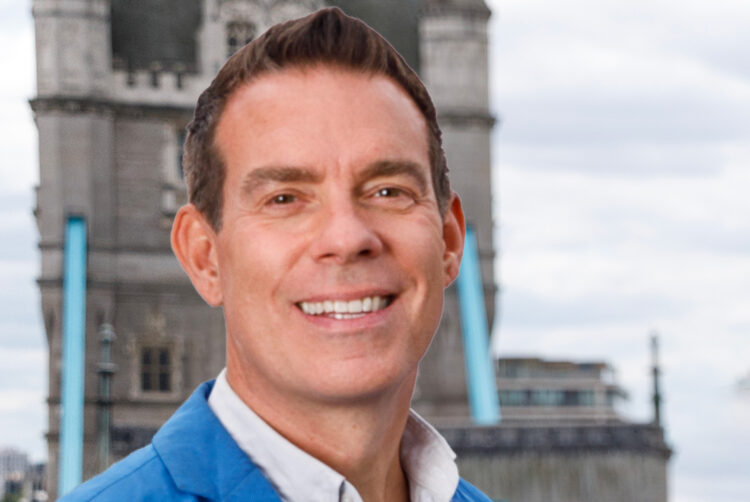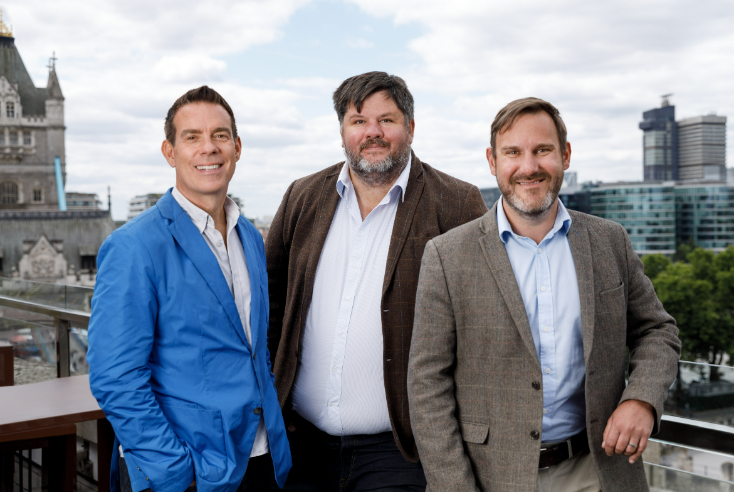Paul Frampton-Calero: retail media ‘wildfire’ has hit Europe

The Media Leader interview
Paul Frampton-Calero, former CEO of Havas, president of Control v Exposed and co-founder of Mad//Fest London, talks to The Media Leader about digital transformation, agency and consultancy specialities and growing a business during the pandemic.
Two-and-a-half years ago, just before the pandemic, Paul Frampton-Calero had a conversation with Jay Friedman, president of US-based Goodway Group, which ultimately resulted in him joining marketing transformation agency, Control v Exposed (CvE).
As president of the agency, the aim was to turn CvE into a more consultative model from its engineering, analytics and data talent base and in the two years since it was founded, CvE has helped brands including BBC, Vodafone, Reckitt Benckiser, TravelSupermarket, KFC and Boots with improving their operating models, technical models, martech capabilities and data engineering.
These services can include developing effective in-housing, hybrid agency and staff marketing teams, helping brands gain media-buying independence, evaluating techstacks’ suitability for marketing operations, and ensuring data connectivity between platforms.
Frampton-Calero’s background is in agency groups and digital, having worked at Havas Media Group for more than eight years, ultimately becoming group CEO for more than two years, and in that time setting up a consulting arm amongst other initiatives.
Describing how his experience at agencies helped him build CvE as a marketing transformation agency, he says he thinks he was the “first digital lead to become CEO of a media agency” and as a result he has always been “very close to disruption around technology” since he started his career in planning and buying before moving into the very early stage of online 20 years ago.
He added: “Media agencies have a very different model to management consultancies, but I believed that [consulting] was the right way to go, so that’s why I joined CvE in the first place. I’d say the benefit is that because I’ve got holding group P&L experience, that’s really valuable when you go and talk to clients because they really want to understand how the holding group thinks about them, and how they are commercially structured and how they manage their resources.”
Building a business in the pandemic: ‘a game of two halves’
But starting and growing a business in the first place during the pandemic was not without its challenges, as Frampton-Calero laughingly describes it as “a game of two halves”.
He says: “It was tough because we were building a business in probably the most complicated period for business for a long time, but we were a remote-first business already, so whilst we got touchdown space in London, we were remote-first as Goodway moved to a remote model 12 years ago so that definitely helped us.”
“And then I’d say the second bit was because we’re focused in digital, data, tech, we’re focused on retail, ecommerce, QSR, all of that group was actually hockey-sticking during that period, so there was more demand for the type of things that we were doing. So whilst it was difficult, I think we were fortunate, a bit like [Sir Martin] Sorrell would say about S4 Capital: if you’re focused on the area, which is growing fastest, then you’re going to do well whereas if you’ve got a legacy business half in the the past and half in the future, then some of the legacy will slow you down a little bit.”
He says the biggest challenge was building culture across three different continents in a remote environment, hiring lots of people who he still has not met, something many businesses can relate to.
On brands’ minds: retail media and the talent crisis
In his conversations with brands and clients, Frampton-Calero says cookie deprecation, digital identity, retail media and in-housing are often front of mind.
“Cookie deprecation and digital identity, which I think are both intrinsically linked, is definitely a major one. Also first-party data, and how to leverage it as an asset — we’re working with Boots Media Group on their retail media, planning and building their technology. We work alongside SMG who are the shopper experts, and we’re providing the technology and the data expertise alongside that to the media group to work out how they scale it and ultimately generate more revenue from it,” he explains.
He predicts a lot of the future-facing plan will be about retail media, as they are seeing in Europe that it is “growing like a wildfire” following the US.
Frampton-Calero remarks: “We’ve got the data and tech and the media backgrounds. We feel like that’s a perfect world for us because we understand DSPs, we understand programmatic, first-party data identity, so we’re going to put a lot of our eggs in the retail media basket.”
Another trend is related to the talent crisis, which spans both sides of the Atlantic, as Frampton-Calero says shortages and salary inflation are “out of control” in the States, commenting that you cannot really hire anyone even with four or five years’ experience for under $100,000 in digital any more.
He says a common trend for brands to ask for is to “in-house something”, build a digital capability they do not currently have, help to recruit and keep talent, or create a culture that attracts agency people in-house.
CvE may recommend that a brand try a managed service hybrid model, and then move towards in-housing rather than try and go there straight away, he says.
Takeaways for media agencies
So what should media agencies take away from consulting?
Frampton-Calero recognises the need for consultative problem-solving should often come before spending paid media money.
He explains: “If your measurement framework is not strong, if the analytics isn’t set up right, if the technology and the data you’re using isn’t fit for purpose, then some of those things need to be fixed before you suddenly start going to throw a load of money because that money is going to have inefficiencies in it. Now, I’m not suggesting that means you should switch your money off and wait until you’ve got to a perfect world, but there’s quite a few holding groups that don’t really have that type of proposition or that type of talent.”
Meanwhile, he recognises digital talent is necessary across the board and can improve media-planning craft.
He explains: “All agencies or consultancies, need more of this type of talent that can get in and actually help with data and technology because we’re living in a world where technology dominates marketing and a big part of the conversation is how do you connect IT and marketing, and how do you help brands grow faster through automation. They’re business strategic things, they’re not just media things, so you can elevate yourselves by taking more of that slightly higher ground.”
“Craft is super important in media planning, but craft can be improved with great technology and data and automation it can help you can build amazing tools, and you can be more data-driven and do more of the right things rather than just using your gut instincts. Because in every other industry, science and technology have changed things over the last 20 years. Advertising was a little bit slow to adopt that.”
Scaling from personal brand to international agency
The goal now is to scale the CvE business, which already has a presence in the UK, the US and Asia, with a team just shy of 20.
Last week, CvE’s parent company, Goodway Group, an independent marketing services business founded in 1929, announced it had acquired UK-based Canton Marketing Solutions, which will be merged with CvE.

Canton specialises in martech consulting and data engineering and was founded by Nick King and Rob Webster who will now join Frampton-Calero in CvE’s leadership team, with King as vice president of commercial and Webster as vice president of strategy (pictured, above).
Canton and CvE had collaborated in the past and with this merger, the hope is to bring together Canton’s implementation and data engineering expertise, with CvE’s advisory talent, combining knowledge of operating models, strategy consulting, along with data and technology, consulting and implementation.
As a result, CvE will grow to a team of 40-strong with 30 to 50 consultants that they hire for specialist work. Currently the US is where “the biggest footprint” of clients sits, but Asia is catching up fast, Frampton-Calero adds.
Talking about the significance of the merger and what CvE will now focus on, Frampton-Calero comments: “We talk about ourselves as as a kind of hybrid between a media agency, a digital agency and a management consultant. Management consultants are brilliant at high level strategy, great at stakeholder alignment, but don’t tend to get too downstream in the how or the implementation and actually half the time just leave it hanging.
“Whereas, media and digital agencies are excellent at planning and audiences and buying, but are usually a little bit myopic on spending paid media money because that’s how they get paid, and they don’t necessarily solve some of the problems around technology or data or ‘dashboarding’ or analytics, so we wanted to live in the middle of those.”
Frampton-Calero says that previously Canton took on agency and brand clients, whereas CvE focussed on brands, but with the merger the new agency can more easily take on both.
“The plan has been to scale it beyond just me and my personal brand, which is where it started, so we’ve built the team across the three regions and now we’ve acquired Canton, this is the scale part of the journey. The plan is to open up and build more client base in different parts of the world, to start to develop a bit more into Europe, go a bit harder into the US. We only really launched the US in Q4 last year, and it’s been good run but a lot of what we’ve done is actually consulting supported Goodway clients. Now we’ll be going direct to market to do more of that there,” he added.
In terms of “dream clients”, Frampton-Calero says CvE does not “obsess” around brands like Nike or L’Oréal, stressing it’s not about a particular client but a set of attributes like being progressive and having an international mandate for change.
He explains: “People that have got a marketing team that’s got a genuine mandate for change, and believes in the value of data and technology and digital to be a growth driver for their business, and, generally, our sweetest spot clients would be people like Nokia and KFC and Boots, who are international, big clients that can invest in building technology and IP and data.”
Frampton-Calero gives the example of KFC’s agile use of data, test and learn and machine learning to change the order of a recipe or choice of meals to try to drive up revenue.
He adds that if the brands are too small, they normally do not have the funds to invest in consulting in the first instance, and in then in the second instance, to invest in things consulting tells you to build.
Additionally, CvE tends to focus on sectors like retail, FMCG, QSR, CPG, ecommerce, and B2B which he says are going through “another wave of digital transformation”.
He says the minute these sectors can capture data, they can personalise it to upsell and boost revenues, adding: “They’re probably the categories that are most fiercely pivoting into a more data and technology world, rather than just relying on brand and franchisees.”



